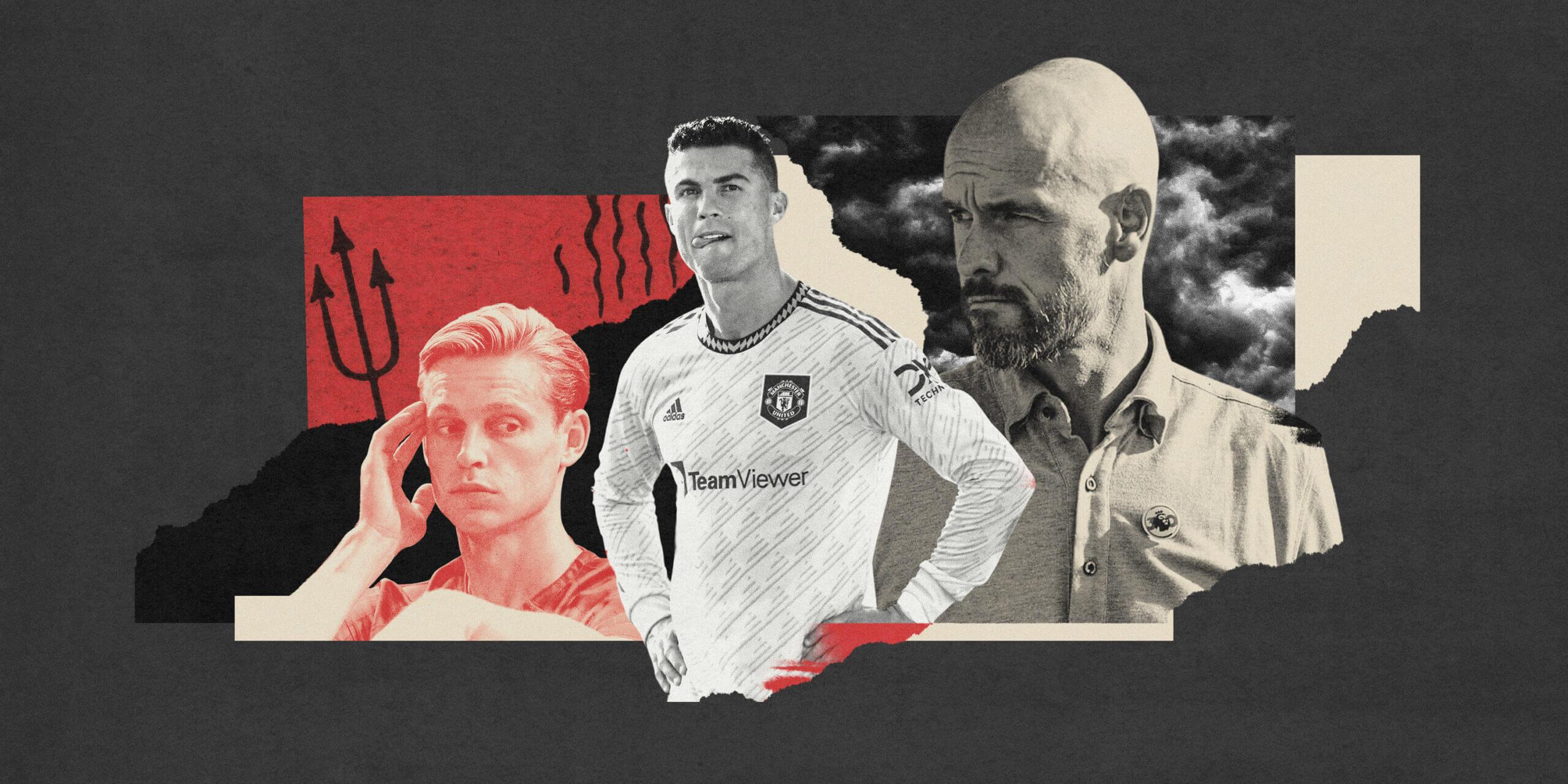
Manchester United – what the rest of football thinks about a club in crisis
44
No club in English football sets tongues wagging like Manchester United. Love them or hate them, in good times and bad, they are a source of endless intrigue and debate.
As much as that applies to fans of every club, it applies to those who work within the game.
For much of the past nine years, the entire industry has looked on with a sense of fascination — at times morbid fascination — as the empire Sir Alex Ferguson built has crumbled.
This season brought the promise of a new dawn under former Ajax coach Erik ten Hag, but a humiliating 4-0 defeat last weekend by Brentford, a club whose 2021-22 top-flight season was their first since the 1940s, left them bottom of the Premier League — played two, lost two.
Add to that a disillusioned Cristiano Ronaldo, another challenging summer transfer window and the growing intrigue surrounding the Glazer family’s ownership of United, with potential investors circling, and the fascination increases.
The Athletic decided it would be interesting to seek the view of people within the game: not the usual array of pundits, but people at other clubs — in some cases, rival ones. What do executives, managers, coaches, recruitment experts, analysts and even agents make of United’s problems on the pitch, in the transfer market and, in a broader sense, the club’s struggle to adapt to the post-Ferguson era?
Enquiries to a wide variety of course met with a predictable series of “no comments”; people who work in football tend not to like commenting on other clubs’ business. But many of them, in senior positions within the game, said they would be happy to speak candidly if their names were withheld to protect their identity.
What follows is a wide range of unusually frank opinions and evaluations on an even wider range of matters relating to the state of play at Old Trafford: from Casemiro to commercial deals, from a leaky roof to a leaky defence, from Ronaldo… to roast dinners.
When it comes to describing United’s decline over the past nine years, there is no shortage of reference points. The Premier League table, the leaky roof at Old Trafford … but what about the matchday menu in the directors’ lounge?
“It’s old-fashioned,” says a director at another club. “On matchday, it’s still three courses — usually a roast — and wine, whereas most clubs have moved to a buffet and modern cuisine. The club still seems to be stuck in the ’90s.”
Others have countered that the food is, in fact, excellent. Like many things in football, it comes down to opinions.
In the not-too-distant past, visiting directors would routinely be invited to have a photograph taken with whatever trophies United had won the previous season. It rubbed up some clubs the wrong way, but it reinforced the feeling of being in illustrious company.
It is not for diplomatic reasons that this practice has been abandoned over recent seasons.
Another regular visitor says United’s staff appear “downtrodden”. “You don’t get any smiles or any sense they’re happy to have you there,” he says.
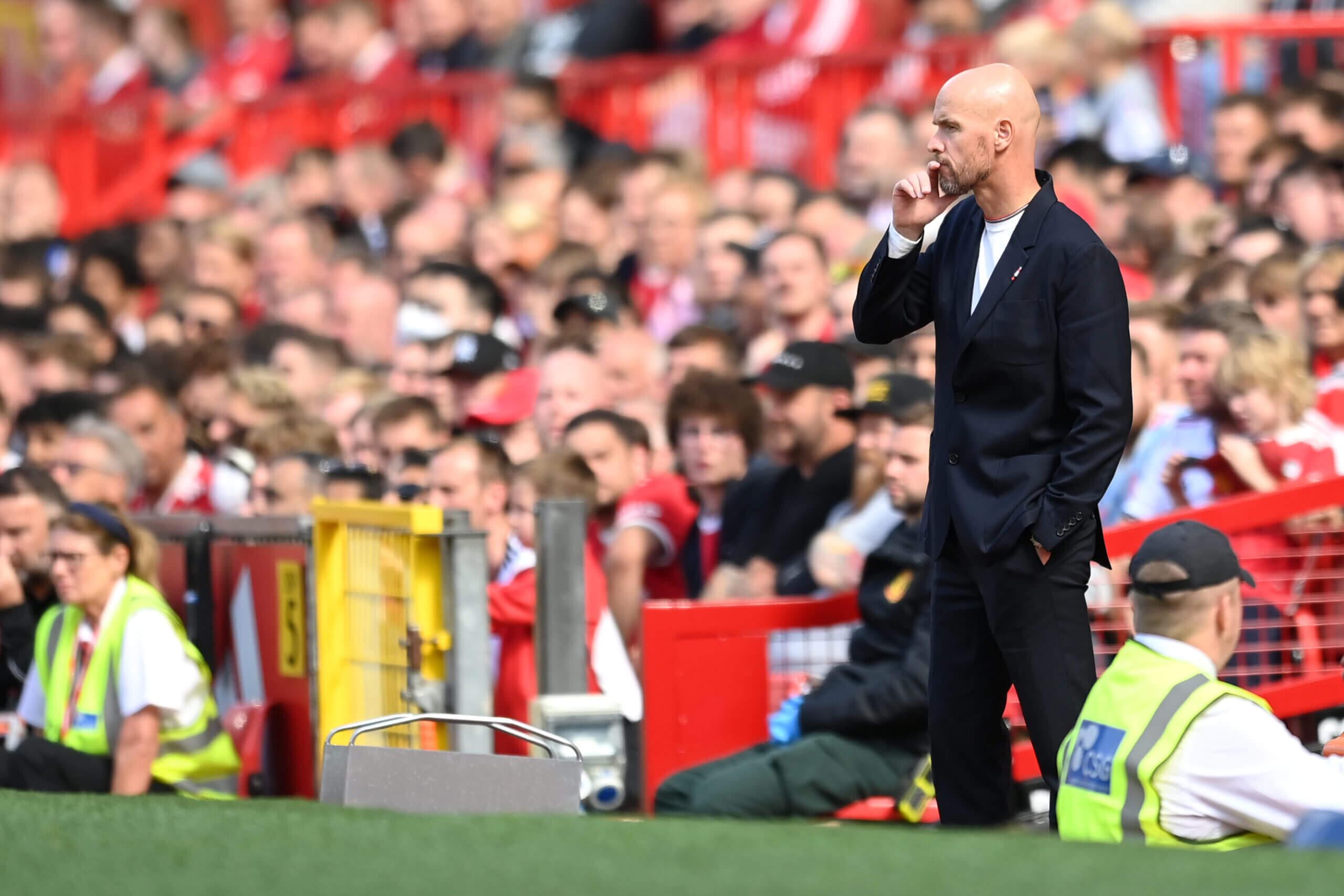
Erik ten Hag has lost his first two games as Manchester United’s latest manager (Photo: Michael Regan/Getty Images)
The perception is of an unhappy club, stagnating under the Glazer family’s ownership. You barely hear a murmur of objection from other clubs about the debt issue, but in other areas the Glazers are held responsible.
Even after 17 years, the Glazers themselves are regarded as an enigma. On their occasional trips to Old Trafford, they are said to exchange pleasantries with visiting directors, but little more.
For years, United attracted admiration from other clubs — sometimes grudging, very often not.
One former club chairman, now long departed from the Premier League scene, used to talk of clubs being desperate to cling to United’s coat-tails.
One chief executive says his club’s — and, he believes, other clubs’ — view of United has become less sympathetic over the past couple of years, such has been the distaste for their role in the attempted European Super League launch and the earlier “Project Big Picture” proposals.
“When David Gill was there, and even in the early years of Ed Woodward, there was an enormous respect for the football club,” the executive says. “Even if you didn’t agree with their position, you respected it. I don’t believe the club carries the same respect now. That applies to other big clubs too, but United haven’t even got their own house in order.”
That applies in a literal sense too.
Old Trafford was one of the best stadiums in Europe when the Glazers bought United in 2005 but it has appeared frozen in time. There has been a persistent issue with leaks in the roof. Visitors from other clubs say it looks “tired”.
“Everything about the club has the sense of a very big ship that hasn’t been modernised for a long time and is going to take a long time to turn around,” says one executive.
Even the club’s much-vaunted commercial prowess doesn’t attract quite the same admiration these days.
The commercial director at another club says United’s pursuit of so many sponsors in different sectors and regions was groundbreaking in the 2000s and early 2010s — but that other leading sides are now more “future-facing”. This, he says, is why United’s commercial revenue has flatlined since 2016.
He cites the example of Manchester City’s partnership with online gaming platform Roblox. “That was very clever,” he says. “It’s interactive and fun, with Manchester City-themed characters et cetera. It will make money for them, but also turn the youngsters into fans for decades. They are getting in front of eight-to-15-year-olds and engaging on their terms.
“In the past, that would have been United at the very top of the game, leading the way.”
That perception of United living in the past, resting on their laurels, is a common one.
One executive at a Premier League club talks of “a complacency, an arrogance — that thing of, ‘We’re Manchester United’.”
“Yes, they can still attract massive sponsorship deals, because they’re Manchester United,” says another. “But they’re losing their touch.”
Another: “It’s ironic that in Premier League meetings they’ll talk about the size of the club they are, yet right now they’re bottom of the table. I know it’s only two games and I know it will sound like a cheap shot, but in terms of how the club looks and feels, it’s almost not a surprise.”
A manager adds: “It’s not enough just to think, ‘We’re Manchester United’. You’re a team that’s not performing, so you’ve got to focus 100 per cent on building a team — not a brand, but a team. But that’s difficult when you’ve got owners who are focused on the brand. So what’s the plan?”
May 8, 2013 — the day Sir Alex Ferguson announced he was retiring after more than 26 years as Manchester United manager.
“My first thought was, ‘They’re going to have to change’,” an executive at another Premier League club says. “Specifically, they were going to have to appoint a director of football. They couldn’t have brought that type of figure in when Ferguson was in charge — they just couldn’t — but the moment he left, they needed to do that.
“Football has changed. Ferguson was the last manager who controlled everything. They needed to build a modern football architecture. Until that point, their whole operation was built entirely on the genius of one man.”
“Architecture” is the type of word that would have been derided in football circles in 2013, but everyone understands the meaning now. The structures that are widely admired at Liverpool and City, at Brentford and Brighton, are the result of architecture: a vision, a design and, ultimately, a building project where every part of the football operation reflects a plan.
“And it’s been nine years (since Ferguson retired) and they (United) still don’t seem to have that architecture,” that same executive says. “They lurch from one kind of manager to another. No continuity, no seam, no consistent plan. I find it staggering.”
For five years, faced with growing criticism of their recruitment in the post-Ferguson era, United resisted calls to appoint a director of football.
It finally became a priority in the summer of 2018, as they faced up to a growing divergence between the club’s recruitment ideas and those of then-manager Jose Mourinho in his fractious final months in charge. But then Ole Gunnar Solskjaer took over that December, briefly restored a semblance of unity and suggested there was no need for a director of football. That seemed to be accepted by a hierarchy which had never fully grasped the concept of the role.
In March last year, nearly eight years after Ferguson’s departure, United responded to two particularly chaotic transfer windows by promoting internal candidate John Murtough to the new role of football director. Former United midfielder Darren Fletcher became technical director.
But many of those who spoke to The Athletic for this article questioned the success and the validity of that long-overdue restructure.
An executive at a Premier League club: “You’ve got this confusing structure where John Murtough is the sporting director and Darren Fletcher is the technical director. What’s the difference? How does that work? When you contact the club, do you speak to John or Darren? Or do you speak to Richard Arnold, the chief executive? Or the club secretary (Rebecca Britain)? What’s the hierarchy? Who’s calling the shots?”
An agent: “Even to do what should be a simple deal, you find yourself having to speak to at least three different people. You take Man City or Liverpool; they’ve got a clear structure and you know who does what. I don’t see any of that at United. When people say it’s chaotic behind the scenes, it really looks that way.”
Another agent: “There’s still no real sporting director. I know they looked at Paul Mitchell at Monaco. He’s done a good job everywhere he’s been. They need someone like that to go in with the ability to make changes. It’s a full rebuild. I feel they only do partial rebuilds. Partial rebuild after partial rebuild.”
One sporting director wonders whether, despite the perception of there being too many cooks, United are still short in certain areas. He describes Murtough as a competent operator, but suggests United lack experience and connections in the transfer market. More broadly, he believes, they lack a visionary.
Another experienced recruitment figure suggests the answer to this part was staring them in the face.
“They appointed Ralf Rangnick as interim manager last season when they should have appointed him in a strategic role,” he says. “At the very least, they should have kept him on in a strategic role — planning, overseeing the structure, the recruitment, making sure everything is aligned.
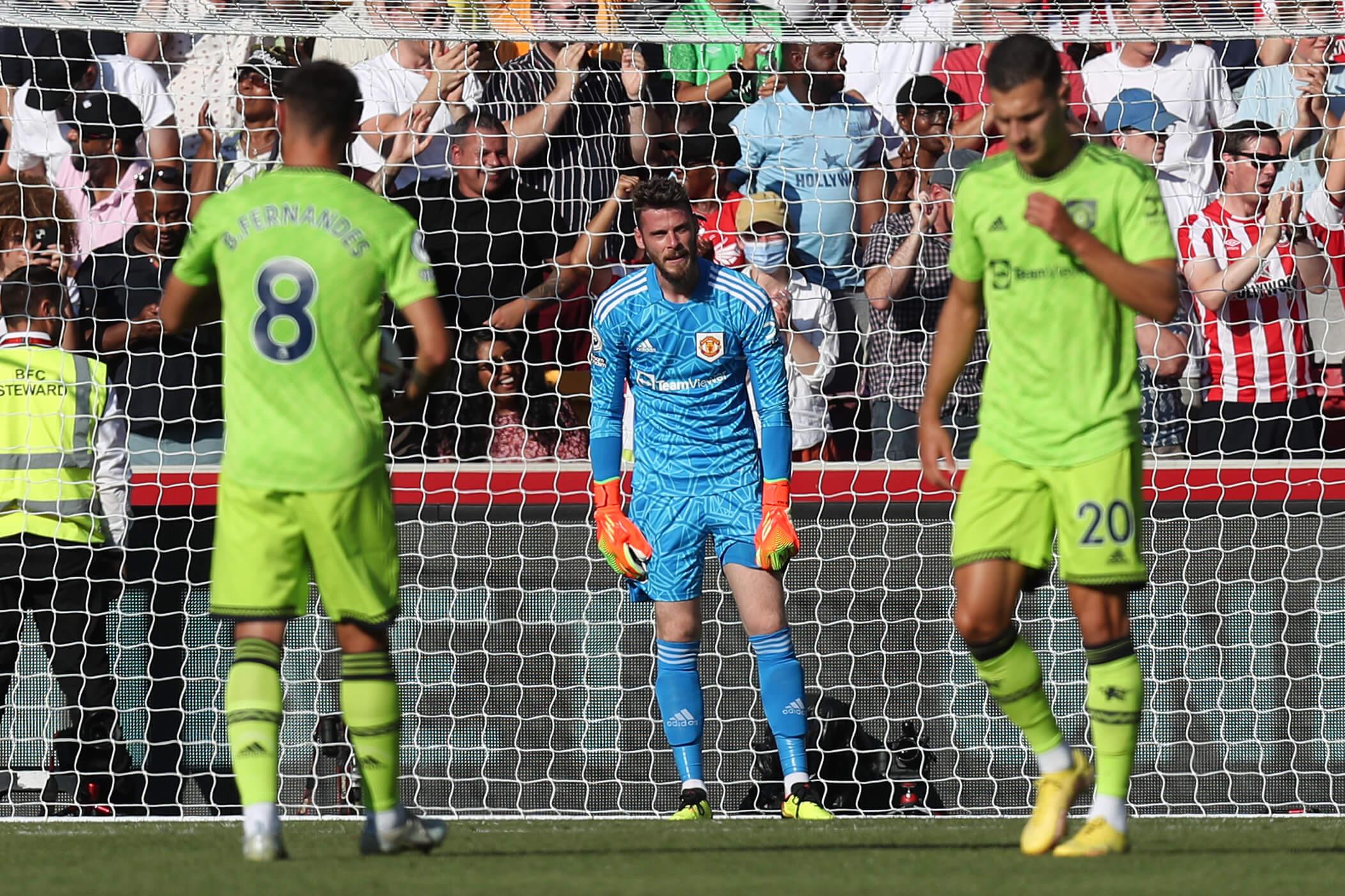
United plumbed new depths in losing 4-0 to Brentford and are now bottom of the league (Photo: Mark Leech/Offside/Offside via Getty Images)
“They had already agreed to do that, hadn’t they? Wasn’t he staying on as a consultant? But then they just let him go and take the Austria job. From what he said in the media, his assessments were spot-on. But maybe it wasn’t what the people in charge wanted to hear.”
“Fans — and the media — make the mistake of thinking it’s like playing Football Manager: find a player who scores a lot of goals, make a bid, offer a contract, job done,” says one figure, highly experienced in scouting and recruitment. “It’s not. Nothing is straightforward.
“But… I don’t understand how United make it look this difficult year after year. They knew what they needed this summer. It was obvious. But we’re getting towards the end of August and they’re still going around in circles again.”
A data analyst at one club cites the seemingly doomed summer-long pursuit of Barcelona’s Frenkie de Jong as “a prime example of chasing a player who either wasn’t available or didn’t really want to come — and now with two weeks before the deadline, they’re going back to the drawing board”. Fellow midfielder Casemiro, of Real Madrid, looks like a “desperate” potential signing rather than a strategic one, he says.
At this point, we’ll just let the quotes run.
A manager: “It looks like there’s a scattergun approach. It doesn’t look calculated, like they’ve got really identified targets. From De Jong to (Adrien) Rabiot to Casemiro, it doesn’t make sense to me.”
Data analyst: “For a period, they had a good go at building a young, exciting team, signing the likes of (Jadon) Sancho and (Aaron) Wan-Bissaka and nearly getting (Jude) Bellingham before he went to Dortmund. Then all of a sudden they abandoned that and signed (Raphael) Varane and (Cristiano) Ronaldo on mega money.”
Sporting director: “Every time they make a change, you think, ‘They’re finally going to get it right this time. We’d better be on our toes’. But they keep getting it wrong. How have they ended up in this situation in mid-August again?”
Agent: “It looks like so many of the decisions are either emotional — re-signing Ronaldo — or they’re giving too much power to a manager. Of course, a manager should have a say. Of course, they should be able to say yes or no to a player, but they shouldn’t run the recruitment process in this day and age.”
Manager: “They’re going after the older ones again. They need to look at younger players who fit the way they’re trying to play. You look at Manchester City signing Sergio Gomez from Anderlecht. That’s not a strange signing. You can see the methodology behind it. I just don’t see that with United.”
Agent: “There have been some amazing players on the market this summer and United haven’t been anywhere near them. Do they even know these players exist?”
Well, yes they do.
In fact, United officials talk with some degree of pride about the breadth and sophistication of their scouting database. They boasted of having analysed 804 right-backs before settling on Wan-Bissaka (who, three years after his arrival from Crystal Palace in a projected £50million deal, is now available for a knockdown fee).
But the merits of that database and their approach to scouting are questioned. The last revamp of United’s recruitment operation saw them hire dozens of scouts across Europe, several of them covering each of the leading leagues, with a view to accumulating in-depth knowledge of every player they possibly could.
It might sound like a perfectly reasonable approach — no stone left unturned — but a scout at a rival club says it is a waste of resources. He talks of United scouts being disillusioned, watching mid-table games in France, Germany and Italy knowing there is not a single player on the pitch who fits the club’s requirements, compiling reports for the sake of it.
“You do get the odd gem in Ligue 1,” the scout says. “You look at (N’Golo) Kante and (Riyad) Mahrez when Leicester signed them. But United don’t seem to want to sign up-and-coming players and develop them. They seem to want proven players, big-name players, for big money. If one of their scouts says he’s found the next Riyad Mahrez, is his voice heard back in Manchester?”
The perception is one of a disjointed approach off the pitch as well as on it: a large (and possibly oversized) scouting operation trying to find hidden gems while managers recommend the tried-and-trusted and the hierarchy appears in thrall to star players with a certain reputation and profile.
That perceived disconnect comes as no surprise to a football recruitment expert who, having worked at several European clubs, was invited to share his ideas with United with a view to a possible job opportunity a few years ago.
“They asked how I had built a scouting department at my previous club: the whole process, everything about the market,” he says. “They wanted to start from scratch, focus on data scouting, but they had no feel for it, no vision for the market. Nothing made sense and it made me very apprehensive.
“I saw this (their current struggles) coming.”
A manager in League One — English football’s third tier — says there is only one thing that makes him question his lifelong love affair with football: wasted talent.
He sees far too much of that when he watches United games, high-profile players performing at a level far below their ability and their reputations. Players acting as individuals, not as a team. The precise opposite of what United were under Ferguson.
“I think you get a lot of prima donnas at the top end of football,” the manager says in response to a question about United. “The money at the top level… it’s too much, isn’t it? There are players at the top level who work incredibly — an example to everyone — and they deserve everything they get. But there are others who… .”
He expresses disgust at United’s first-half performance at Brentford last weekend. “They looked like they were beaten before they went out there,” he says. “At our level, you expect every player to roll their sleeves up and do their best. So when you see players of that ability tossing it off… I don’t want to say tossing it off, but… .”
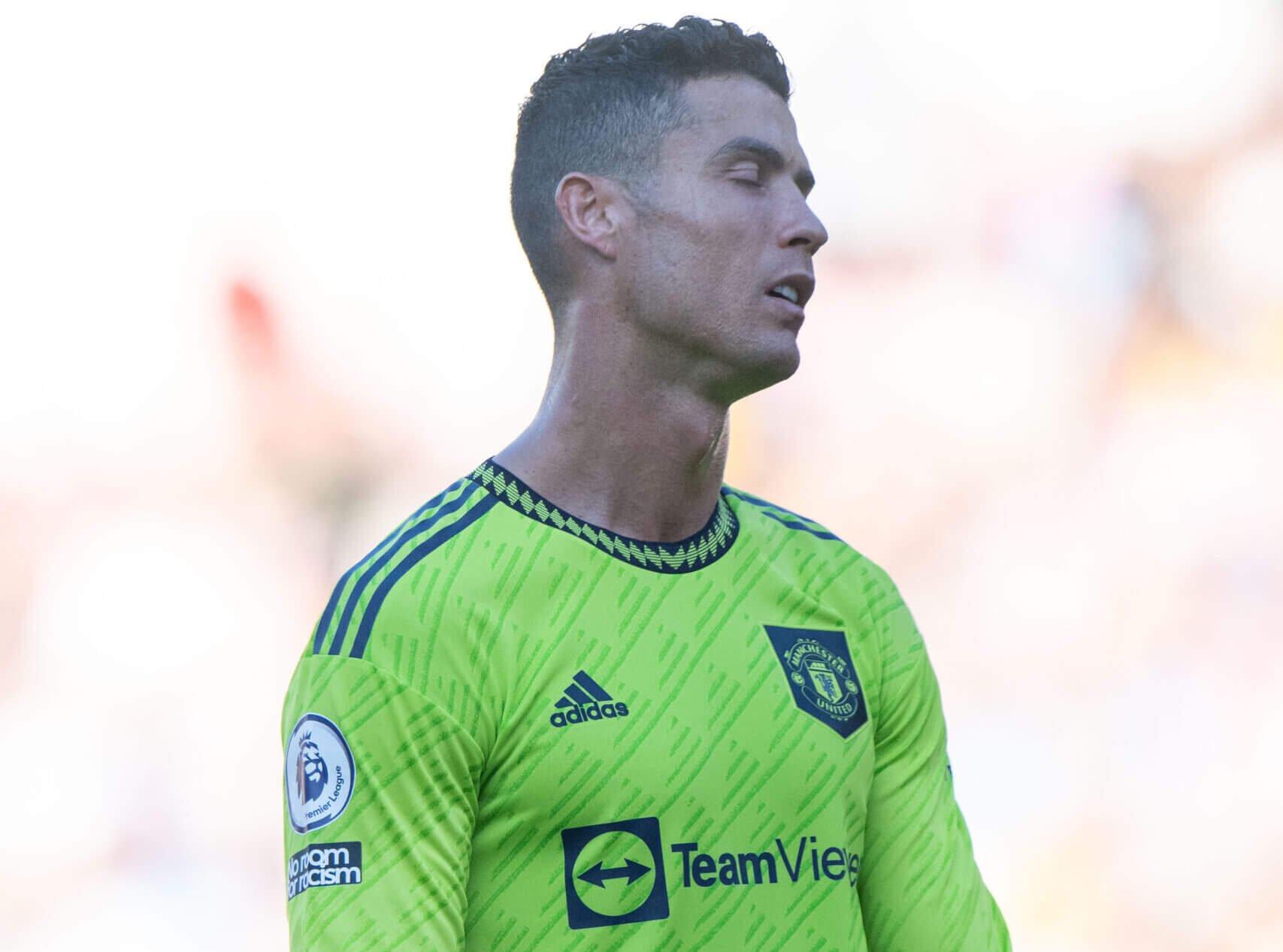
Superstar Ronaldo wanting to leave just a year after rejoining United is another headache (Photo: Sebastian Frej/MB Media/Getty Images)
This manager points fingers at individuals — some departed, some still there — but suggests the modern United, a team so much less than the sum of its expensive parts, is symptomatic of all the issues already highlighted in this article. Dysfunction off the pitch has brought dysfunction on the pitch.
Whatever the shortcomings of individual managers or players, the malaise goes much deeper.
So many people question the “culture” and the team environment at United. There have been brief uplifts under different managers, but the sense of unity and the never-say-die spirit that defined the club in the Ferguson years — or Manchester City now under Pep Guardiola or Liverpool today under Jurgen Klopp — is nowhere to be seen.
“There’s such a negative atmosphere around the club now and that must be carrying into the building,” an agent says. “The players’ body language at Brentford was so bad. When they went 1-0 down, that was that. You knew they were going to lose.
“If Man City or Liverpool go 1-0 down, you still expect them to come back and win. If Man United conceded first, they give up.” That assessment seems harsh. United won 10 Premier League points last season after falling behind, only eight teams fared better.
This agent says he would currently advise players against United because the atmosphere appears “toxic” and “you know you’re going to get caned”.
Another agent says similar: “Right now I couldn’t look my player in the face and say it’s a great opportunity.”
Yet another agent, this one a lifelong United fan, says he constantly asks his players (who are at other clubs at various levels) about the issues at Old Trafford and is exasperated when they absolve Ronaldo of blame. “Players worship Cristiano and won’t hear a word against him,” he says. “But when you see his performances and his body language, it drives me mad.”
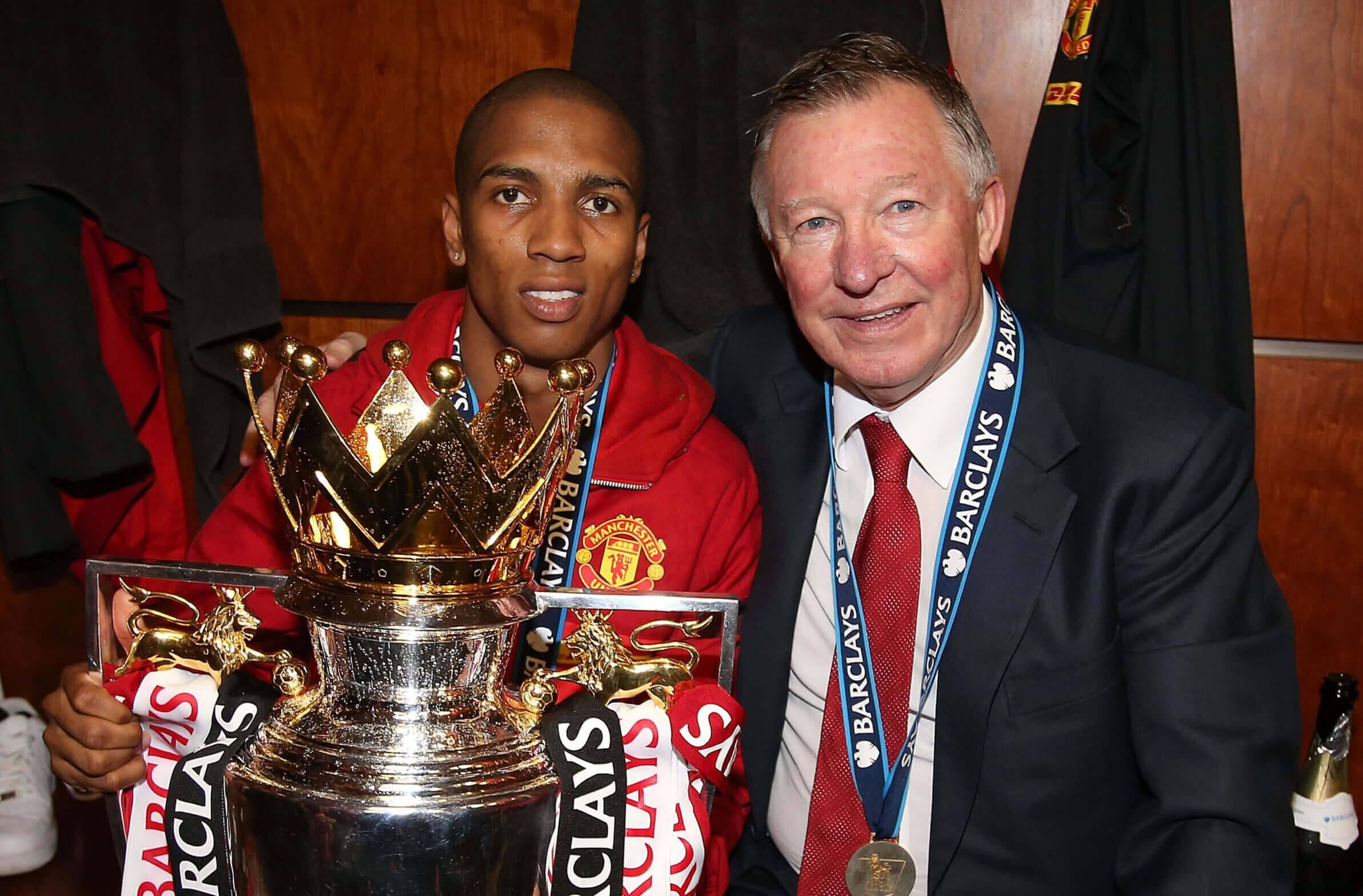
It’s nine years and counting since United were last champions in Alex Ferguson’s final season as manager (Photo: Matthew Peters/Manchester United via Getty Images)
The Ronaldo issue divides opinion, but another agent says, “These issues haven’t just been happening since Ronaldo came back (last summer, after 12 years playing for Real Madrid and then Juventus). I think it’s more stemming back to the culture at the club. That’s the issue, not Ronaldo.”
There is a sense of solidarity within the management/coaching fraternity. Yes, it can be dog-eat-dog, yes one manager will happily talk to a club behind another’s back, but broadly speaking there is sympathy for those coaches battling with inherited problems, as Ten Hag now is.
A League One manager describes watching United over the past fortnight, in the losses to Brighton and Brentford, as a painful experience. But he sympathises with Ten Hag, just as he sympathised with Rangnick, Solskjaer, Mourinho, Louis van Gaal and David Moyes — the men who have managed United since Ferguson stepped down.
Managers point to United’s recurring failures with regard to vision, structure and recruitment. One suggests the club have become a “circus — a totally different entity to what it was in Fergie’s time”. “There’s been too much focus on individuals, big names,” the manager says. “Until they get away from that and focus on being a proper team, nothing is going to change.”
That has been every manager’s intention since 2013, of course. But for Ten Hag, it is easier said than done when the initial feel-good factor has been wiped away by the Ronaldo furore, the familiar chaos in the transfer market and the gloom that has deepened with these two abject defeats.
Is it feasible to try playing out from the back, the style Ten Hag wants, with David de Gea and Harry Maguire in the side? “Every team in the Premier League plays out from the back,” the League One manager says. “Every defender is capable of doing it. Players at our level can do it. I don’t subscribe at all to the theory that their players can’t do it.
“And if it’s not working, the manager and the players should be savvy enough and experienced enough to change it for five or 10 minutes until you stabilise. We had that in a game recently at our level where we were overplaying and the opposition were on to us. Go back to basics for five or 10 minutes, then we sorted it out at half-time.’”
What about signing Lisandro Martinez, who is 5ft 9in (175cm), to play in central defence?
“I wouldn’t want a 5ft 9in centre-half in League One,” the manager says. “It’s different in the Premier League because it’s very technical and there are nothing like as many high balls, but funnily enough, they’ve done that just as the big centre-forward is coming back into fashion. Not just Ivan Toney (of Brentford), but Erling Haaland, Darwin Nunez and some of the others who have been signed this summer.”
One coach at another Premier League club says that, while it is difficult to assess from afar, his early appraisal of Ten Hag’s United is that some elements of their play appear “forced”.
Asked to expand, he says, “Some build-up mechanisms, some movements where they were looking for the third man, or passes from the defensive line. You could detect that they were done following an instruction.”
Isn’t playing to a manager’s instructions generally considered a good thing? “Yes, but it looked unnatural to the team — similar to how it looked with (Louis) van Gaal’s United. It looks like there are some really elaborate instructions with the ball, yet it looked careless in other aspects — like leaving themselves too open when attacking, leaving too much space to get hit on the counter.”
“Settle on your way of playing and stick to it,” says a performance director. “I don’t mean stick to it for every minute of every game. I don’t mean doing things blindly. But stick to your beliefs.”
One scout, who studied Ten Hag’s Ajax closely, describes him as a “brilliant coach” but says there are two unknowns: 1) how he will cope with the contrasting tactical challenges of the Premier League and 2) whether he has the personality to impose his beliefs on this group of players and characters. “If it was purely about coaching, no problem,” the scout says. “But he’s got so much more on his plate there.”
Not least the Ronaldo issue.
One agent suggests Ten Hag erred by recalling the superstar forward against Brentford (he’d been a substitute for the Brighton game), given his desire to leave and his limited involvement in the club’s pre-season programme, but another says the Dutchman is damned whatever he does with Ronaldo. “The Cristiano situation is impossible to manage,” the agent says.
A coach at another Premier League club: “Ajax is a little bubble by comparison. This is real life, a massive club, players with more ego. You have to adapt. The pressure and scrutiny is so big that for the first time he has to adapt to survive.”
Another coach: “Ajax had a clear philosophy. They had the best players in Holland and they could still win games while learning his way. But in the Premier League you’re playing against better teams with better players and very good coaches. As soon as one team works out how to beat you, others follow and there’s little you can do. He won’t have had to rely on a Plan B before.”
A sporting director: “I actually think Ten Hag is a really sensible appointment. He’s a really good coach with a clear view of how he wants to play, but it’s going to take time when the squad he’s inherited is so disjointed because of everything else we’ve talked about. Everything comes back to that.”
It is hard to resist that earlier metaphor about the “very big ship that hasn’t been modernised”. The bigger the ship, the harder it is to turn around when it drifts off course.
Iceberg ahead? Probably not. This isn’t 1974, when United were relegated to the old second division six years after winning the European Cup. This is the super-club era, when so much of the wealth is concentrated among the richest, most powerful clubs in Europe — and in the Premier League in particular.
Even last season, when underperforming terribly under Solskjaer and then Rangnick, United finished sixth, qualifying for the Europa League. Their lowest finish in the nine seasons since Ferguson’s retirement is seventh in that first year under immediate successor Moyes (who was fired before the end of it).
For as far as United have fallen, the club’s wealth still provides a safety net.
As such, there is not a great deal of sympathy within the game. There aren’t too many tears shed — particularly among those clubs who feel the Glazers and the United hierarchy have appeared more interested in reshaping elite football, for their own interests, than reinvigorating their own club.
There is, though, a sense of disappointment on behalf of “good people who have been caught up in a malaise that’s not of their making,” as another club’s chief executive puts it: “It’s a great institution that should be in much better shape than it is.”
Another executive ponders the question of whether it would be better for the Premier League as a whole if United were in better health.
“To be honest, it probably doesn’t make the blindest bit of difference,” he says eventually. “The thing about Manchester United is that people all over the world, whether they support the club or not, will watch them regardless — as their owners know very well.”
